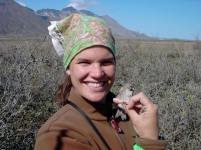Radford University
Sara O'Brien
Professor
Biology, Dept of
- Phone:
- (540) 831-6431
- Address:
-
Center for the Sciences 175
PO Box 6931 - Email:
- sobrien3@radford.edu

Courses Taught
- BIOL 160 - Introductory Seminar in Biology
- BIOL 310/311 - Human Structure & Function I and II
- BIOL 351 - Comparative Physiology
- BIOL 411 - Advanced Human Physiology
- BIOL 460 - Senior Seminar in Biology: Science & Society; Science & Politics; Science of Environmental Justice
- BIOL 477 - Neuroscience
- BIOL 481 - Special Topics: Conservation Physiology
- BIOL 491/492 - Directed and Independent Undergraduate Research: Topics in Ecotoxicology & Ecophysiology
- BIOL 493 - Apprentice Teaching in Biology: Peer TAs for Anatomy & Physiology
About
Scientific Areas of Interest:
physiology, endocrinology, neuroscience, reproduction, pollutants, microplastics, toxicology, conservation
Research Interests:
Broadly, my research could be characterized as how organisms react to a dynamic environment; meaning, how does an organism's physiological processes allow it to react to environmental changes, both natural (seasonal changes, food abundance changes, social changes, etc.) and non-natural (global warming, pollutants, human disturbance, etc.). I usually work with a variety of vertebrates including birds, fish, amphibians, reptiles, and small mammals. I am often focused on the mechanisms of reproduction and what factors influence an organism’s reproductive physiology. Much of my recent work focuses on discovering how pollutants like endocrine disrupting chemicals (EDCs) and microplastics may impact terrestrial and aquatic organisms’ growth, development, mortality, behavior and fecundity. My research takes place both in the field (I have worked at sites in Kenya, the Arctic Circle, Argentina, as well as local field sites) and in the laboratory (I work extensively in the Radford University Vivarium).
Undergraduate Research:
I welcome working with undergraduates on novel research projects. Students should contact me to determine if I have an opening in my lab and if there is room to work on an established research project. Sometimes, depending on the background and experience of the student, I might help them develop a project of their own. Students will learn a lot, participate in hands on activities, and develop a sense of ownership over their portion of a project! To be successful in my research lab a student will need to have a strong work ethic, good communication skills, fine attention to detail, the ability to work odd hours (including weekends and early mornings when needed), the ability to do field work (including in inclement weather), a positive attitude, a punctual and dependable sense of time, and a sense of humor! My lab group meets ~weekly to discuss current events in science, to discuss deep dives into scientific literature, to participate in relevant professional development , and to hear other students present and discuss their research findings in order to help troubleshoot project obstacles or put finishing touches on soon-to-be delivered research presentations. My lab group maintains a commitment to diversity and inclusion showing respect, kindness, and most importantly, supporting one another’s personal and professional goals. We pitch in an help each other with many aspects of lab work, animal care, and data collection. We do not let each other down. We strive to make STEM more accessible to all future scientists.